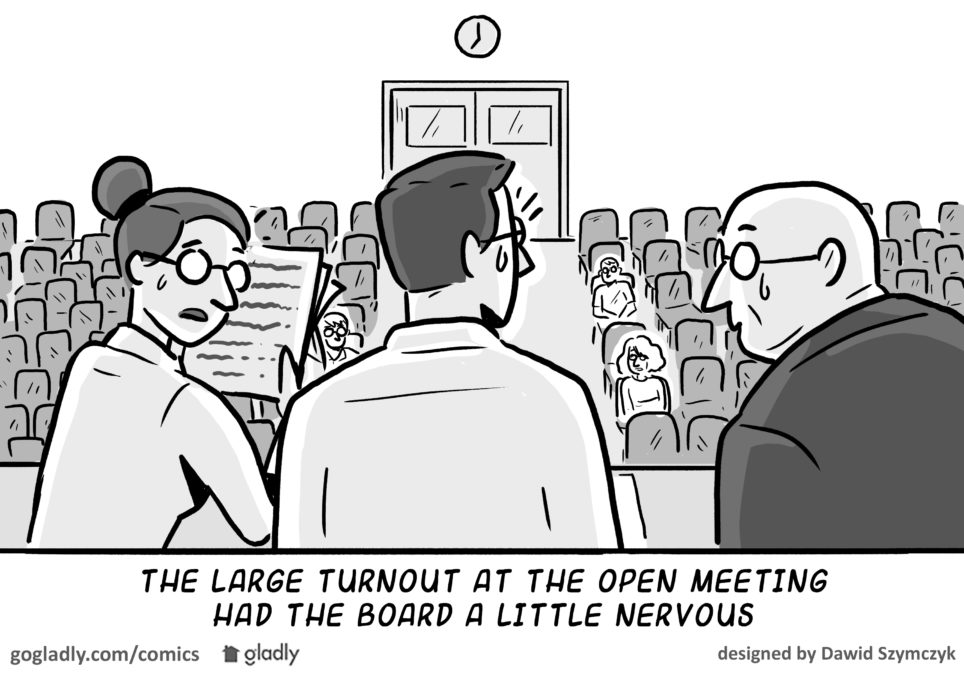When an upset homeowner attends a homeowner association (HOA) board meeting, they believe they have the right to speak to the board, and sometimes demand answers or immediate action by the board.
The California legislature agrees that homeowner members should be heard. That is why the legislature created the Common Interest Development Open Meeting Act CIVIL CODE SECTION 4900-4955
Within this Act, the legislature gives the homeowners the right to be heard, but limits the amount of time the homeowner can demand of the board’s attention.
4925 (b) The board shall permit any member to speak at any meeting of the association or the board, except for meetings of the board held in executive session. A reasonable time limit for all members of the association to speak to the board or before a meeting of the association shall be established by the board.
Although most of us would like immediate answers from the board, it is important that the board, management, and sometimes experts, like roofers/plumbers/arborists, and so forth, review the homeowner request before an informed decision can be made.
4930 (a) Except as described in subdivisions (b) to (e),inclusive, the board may not discuss or take action on any item at a nonemergency meeting unless the item was placed on the agenda included in the notice that was distributed pursuant to subdivision (a) of Section 4920. This subdivision does not prohibit a member or resident who is not a director from speaking on issues not on the agenda.
Patrick Morrisey, President of Yacht Club Condominiums in San Diego, California came up with a dialogue he reads at the beginning of the Open meeting, to help the homeowners understand the board’s role, and the homeowner’s role during the board meeting.
With Patrick’s permission, I have edited this script and present it to anyone that wants to copy and use it for your meetings. In our experience, this introduction helps the homeowner better understand the meeting format, and what is expected of the Board and the Homeowner.
- Town Hall vs Board Meeting, and Why it Matters - January 22, 2018
- Heating Up and Cooling Down - June 29, 2016
- Meeting Minutes Matter™ The Short Term Rental - May 25, 2016



 Help
Help
Having a Town Hall or Good Will meeting where owners can voice their opinions on issues eliminates or helps to put to bed issues that the board or staff may not be aware of. Giving the owners a voice allows them to participate and be heard by their fellow residents and the board.
RE: Membership Meeting, Board Meeting, or other?
It is important to differentiate between the types of meetings.
Board Meetings are where the unpaid volunteers review issues, recommendations, proposals, review violations and delinquencies, hold violations hearings, and more. The Board Meeting should be held without homeowner input, for the most part. The Board should provide a homeowner comment period before board business commences, so homeowners can comment on agenda items in advance of board deliberation and voting. The board should set a reasonable time limit for each speaker (usually 3 minutes), and a total time to hear homeowner comments. This policy should be in writing on each agenda.
Membership Meetings are the annual meeting of the members to elect their board. The board president usually gives a year in review report, and the treasurer reports on the financial state of the associations. The homeowners are usually given a significant opportunity to ask questions.
The Town Hall or Whatever You Want To Call It
Sometimes there is a special meeting for informational purposes. No votes will be taken at this meeting. It is just to reach out to homeowners, give them information, and answer questions. Examples might include meetings to discuss a renovation or reconstruction project; changes to the governing documents; rules changes.
Utah has recently adopted a similar code section to the Utah Community Ownership Act, http://le.utah.gov/xcode/Title57/Chapter8A/57-8a-S226.html?v=C57-8a-S226_2015070120150701 , and the Utah Condominium Ownership Act http://le.utah.gov/xcode/Title57/Chapter8/57-8-S57.html?v=C57-8-S57_2015070120150701. Utah boards have had mixed reactions to the new statute, but in my view it is positive for both homeowners and the Association as a whole.
Thanks for the link to the script!